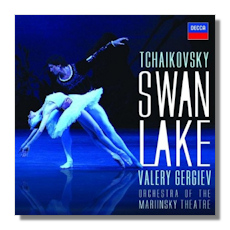
The Internet's Premier Classical Music Source
Related Links
- Tchaikovsky Reviews
- Latest Reviews
- More Reviews
-
By Composer
-
Collections
DVD & Blu-ray
Books
Concert Reviews
Articles/Interviews
Software
Audio
Search Amazon
Recommended Links
Site News
 CD Review
CD Review
Piotr Ilyitch Tchaikovsky

Swan Lake, Op. 20
Kirill Terentiev, violin
Zenon Zalitsailo, cello
Natalia Shlykova, flute
Pavel Kundynaok, oboe
Vadim Bondarenko, clarinet
Sergei Kryuchkov, cornet
Odarka Voshchak, harp
Orchestra of the Mariinsky Theatre, St. Petersburg/Valery Gergiev
Decca 4757669 2CDs 106:59
Highlights also available on single CD: Amazon - UK - Germany - Canada - France - Japan - ArkivMusic - JPC
Full ballet also available on DVD: Amazon - UK - Germany - Canada - France - Japan - ArkivMusic - CD Universe
Full ballet also available on Blu-ray: Amazon - UK - Germany - Canada - France - Japan - ArkivMusic - CD Universe
Summary for the Busy Executive: #surprises.
It would have been a surprise if Valery Gergiev, musical director of the Mariinsky, had no clue how Tchaikovsky's ballets should go. After all, the success of Swan Lake began with an 1895 Mariinsky production, two years after the composer's death. I must admit that, while I like a lot of ballet scores, I don't particularly care for ballet. I've seen enough of them to have suffered through several choreographers and entire companies of dancers who had no sense of rhythm or feeling for the movement of the music. Apparently, Margo Fonteyns and George Balanchines don't come along every day. Rather than watch dancers with apparently no clue where the beat falls, I'll listen to the music without the visuals.
A clueless choreographer nearly did the work in at its 1877 première (in a mutilated version), although cognoscenti recognized the merit of the music. After Tchaikovsky died, his brother Modest revamped the plot, pushed around various numbers to new locations, and with the help of Richard Drigo, who had worked as one of the composer's assistants, had new numbers inserted, mainly from Tchaikovsky's piano works. From this 1895 production, the ballet took off, to the extent that it's a tossup as to whether Swan Lake or Nutcracker is the first ballet the popular mind thinks of when it thinks of ballet at all.
Swan Lake's such a known quantity that there's little point in discussing the music, except to say that almost every number sticks in one's memory. The music has settled into the nerves, sinews, and bones of Gergiev and the Mariinsky orchestra. Happily, the level of playing rises above Gergiev's sometimes slapdash approach in other works. The soloists are all outstanding in their brief moments out front, and the sound is quite fine.
Copyright © 2011, Steve Schwartz





















